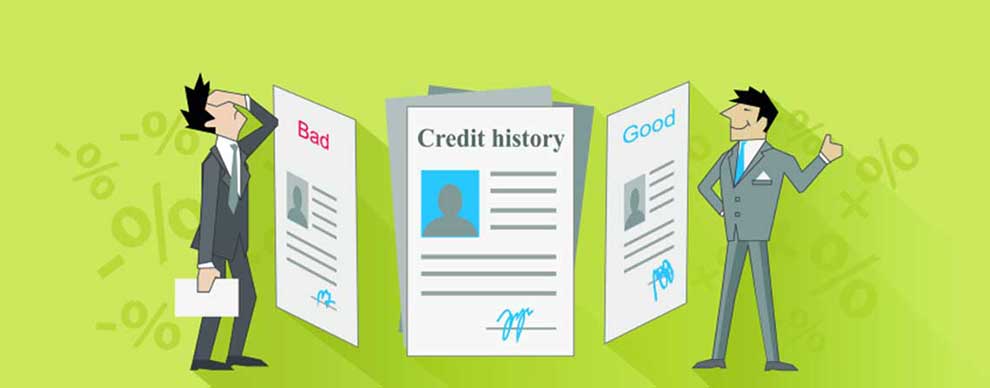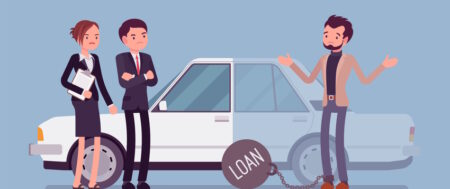A credit score is a number given to an individual by a credit bureau that is designed to help those in charge of handing out loans determine whether or not the individual is credible and worthy of a loan. A high credit score suggests the individual has a history of making payments on time, whereas a low credit score often suggests the individual has a less responsible credit history. If you have a score of zero, it means that you’ve never purchased anything that required regular payments.
Related: What can you do to rebuild credit?
At Econo Auto Sales, we help people with credit issues because we don’t rely on your credit. We look at your stability (time in the area, time on the job, living arrangements, etc.). So, regardless or your history – bankruptcy, divorce, repossession, foreclosure, etc. – we won’t pull your credit – unless you want us to. Your down payment decides which vehicle you can purchase.
We offer a large selection of vehicles from a lot of different manufacturers starting at only $988. And we get more every day. If you’re tired of taking the bus or relying on friends and family to get around, give us a call or come by and we’ll help you drive home in a nice car. We make it easy. We even give you time for your down payment.
A credit score plays a huge role in a buyer’s ability to purchase just about anything that requires financing, including the purchase of a car. The better your credit score, the higher the likelihood you are to receive a loan for a vehicle. However, a low credit score could significantly lower your chances of receiving a car loan.
By fully understanding what a credit score actually is and how it affects your ability to purchase a vehicle, you can know exactly what your specific credit score means and take the necessary action to improve it and take advantage of it in future purchases.
In this review guide, you will learn the exact role your credit score plays in determining whether or not you receive a loan. Each of the most important questions in regard to credit score is answered, and you can find out how to improve your credit score in the event it is not at an ideal level.
All too many take their credit score for granted and suffer from a low score. Oftentimes, low credit scores are due to simply not knowing what factors affect the person’s score, and we aim to shed light on all of the most important questions regarding the subject.
General Information About Credit
It’s important to note that having good credit requires borrowing money. If you don’t use a credit card or get a loan of any sort, your credit will be zero. That’s not as bad as bad credit, but it does make it more difficult to obtain a loan. So the best plan of action if you want to have and maintain the best credit is to borrow money regularly (but not too much) and pay it off on-time, or early.
It is important to understand the basics of credit score, including what exactly it is and how a car loan affects the quality of your credit score. By understanding what all elements affect your credit score, you can take the necessary steps to either improve it or ensure it stays at an optimal level
Will a car loan drop my credit score?
A single car loan should not have a major impact on your credit score. While it is possible a car loan may drop your credit score slightly, the impact is usually very minimal and not more than ten points. Of course, taking out multiple car loans at once – along with taking out loans for other purchases – in a relatively short amount of time can have a much greater impact on your credit score.
However, when taking out only a single car loan, there is no real need to worry about a significant drop in your credit score, assuming you are willing and able to make all of the necessary payments in full and in a timely manner.
Does a car loan help my credit score?
A car loan may not help your credit score right away, but by making payments on a car loan over time, you begin to build a positive credit history that reflects well on your credit report. As you gain a history of making timely payments and being financially responsible for paying back your loan, you are likely to see your credit score begin to rise as a result.
With that said, it is important to not hinder your credit history in other ways, such as missing other loan payments, taking on more loans than you can handle, etc. As long as all other loans are paid on time, making payments on a car loan should lead to an increased score overall.
Do car loans affect a mortgage?
A car loan can affect your ability to get a mortgage, particularly if the car loan was taken out in recent months prior to applying for a mortgage. While taking out a car loan should not have a significant effect on your overall credit score, it can affect your debt-to-income ratio, which may play a role in your ability to take out a mortgage on a home.
However, a car loan that was taken out over six months prior to the application for the mortgage should not negatively affect your ability to get the mortgage. In fact, timely payments on a car loan can show that you are responsible financially and reflect well on your credit report, which should actually lead to a positive effect on a mortgage.
Can you get two car loans at the same time?
Yes, it is possible to get two car loans at the same time, but being approved for two car loans is far more difficult than simply being approved for one. When getting two car loans at the same time, the buyer likely will need to have an above average credit score and not have too many other debts to their name.
It is also important to keep in mind that while one car loan may not negatively affect your credit score, taking two out at the same time may temporarily lower your score. However, if the credit score is lowered, it should quickly rise back to an optimal level once you begin to make timely payments on both vehicles.
Understanding How Paid Collections Work
Paid collections are payments that were considered late, but the individual settled the debt or paid in full. They often show up in a credit score and can have an effect on your overall credit score.
It is helpful to have a full understanding of how paid collections affect your score and how long they stay on your credit report. By understanding paid collections, you can ensure they do not affect your credit score in a negative manner and take the proper action to address them when they present themselves.
Does paying off collections improve a credit score?
Whether or not paying off collections improves your credit score is dependent on the exact type of collection. In many cases, paying off collections does not improve credit score, but it helps to ensure your credit score is not continually effected in a negative manner.
In general, it is a good idea to pay off collections regardless of whether or not it improves your credit score. By making an effort to pay off collections, you can avoid a harsh drop in your score from missed payments and create responsible financial habits that can carry you moving forward.
Can you get a collection removed from your credit report?
It is possible to have a collection removed from your credit report, especially if the collection is inaccurate and not supposed to be there. The best way to have a collection removed from your credit report is to file a credit report dispute with the bureau, who can then remove the debt from your report.
In the event the debt is accurate and does belong to you, it may be able to be removed if the debtor is not legally allowed to collect from you. However, battling an accurate collection is often not the best route, and it is best to try and pay off any loans that are considered late as soon as possible to minimize the effect it has to your credit score.
Do paid collections hurt your credit?
Paid collections can hurt your credit score and lead to a significant drop in your total number. However, there are varying factors that determine how much of a negative effect a paid collection has on your credit score, including how long ago the collection occurred. While a recently paid collection may have a strong negative effect, one that was fully paid several years ago is not likely to affect your credit in a significant manner.
With that said, a paid collection is much better than an unpaid collection. While a paid collection can temporarily lower your score, an unpaid collection can have a much worse impact and affect your ability to get a car loan from a traditional dealership, mortgage and many other types of loans.
How long does a paid collection stay on your credit report?
Paid collections can stay on your credit report for up to seven years, and they can also affect your credit score in a negative manner. When a collection shows up on your credit report, it is best to pay it in a timely manner, which may help to reduce the negative effect on your score long term.
As time goes by, the effect a paid collection that remains on your credit report starts to diminish, and while it can still show up years later, it usually does not greatly impact your score. When a paid collection shows up on your credit report, the important thing to do is to pay it off in full and be financially responsible moving forward as the more recent loans have a stronger impact than paid collections from years back.
How long can a collection agency attempt to collect a debt?
The timeframe for how long a collection agency can attempt to collect a debt varies for each state, but the average length of time falls between five and seven years from the time the last payment was made. The official state law that dictates this policy is referred to as the “statute of limitations,” and it is best to look up the exact length of time for your specific state.
While understanding how long a collection agency has to collect a debt can provide useful information, it is best to pay off any unpaid loans as soon as possible after they are late when trying to minimize the effect a collection has on your overall credit score.
Your Credit Score When You Pay Early
One of the best things you can do to help your credit is to ensure all of your payments are made on time and avoid making any payments late. One way of ensuring this is the case is to simply pay them early. However, many are afraid that paying off a loan early can affect a credit score in a negative manner.
By fully understanding what happens to your credit score when you pay early, you can use paying early in the proper manner to ensure your credit score is as high as it can possibly be. The following are five of the most frequently asked questions about the effect of paying early has on credit.
Typical credit scores and car loan rates*
The table below shows the differences people can expect to get for their interest rates at various credit scores. As you can see, bad credit can cost a lot of money over time.
| Credit Score Range | New Car Loan | Used Car Loan |
| 781 to 850 | 2.6% | 3.4% |
| 661 to 780 | 3.59 % | 5.12% |
| 601 to 660 | 6.39 % | 9.47% |
| 501 to 600 | 10.65 % | 15.72% |
| 300 to 500 | 13.53 % | 18.98% |
Is it better to pay off your car loan early?
Paying off your car loan early does not usually improve your credit score more than paying on time might. However, it does not hurt to pay your car loan off early either in most cases. While it is important to look for an early payment penalty in the contract, paying months in advance is often helpful.
Although it may not technically be better to pay off your car loan early, paying early can help you avoid missing a payment due to the inability to pay one month or simply out of neglect, which can and will affect your score in a negative manner. Therefore, in the sense you are less likely to pay late, paying your car loan early is often even better than paying on time.
Does paying off a loan early hurt credit?
Paying off a loan early does not hurt your credit in almost every instance unless there are stipulations placed in the contract that specifically forbid early payments.
However, there are several different areas of thought as to whether or not you should pay early or on time each month.
Of course, by paying early and getting ahead on your loan, you minimize the risk of ever being late, which would indeed hurt credit. However, paying on time over a long period of time can show you are financially responsible and consistent in your payments, which is certain to reflect well on your credit score and credit report as a whole.
How does paying off a loan early affect credit score?
Paying off a loan early should not have a negative effect on your credit score, but it may not help it much either. In many cases, it is best to pay on time each month over an extended amount of time as it shows you to be financially consistent and reliable.
While it seems obvious that those who provide the loan would welcome early payments, it often means the interest on the payment is lowered when doing so, resulting in them not making as much money. Therefore, it may be more encouraged to pay on time each month, rather than always paying in advance and reducing the length of time you make payments on the loan.
Will paying off a car loan early improve credit?
Paying off a car loan early can lead to an improved credit score if it is done consistently over a long period of time. However, paying early is not likely to improve your credit more than paying on time would as both strategies are likely to improve credit.
With that said, it is often a good idea to pay a car loan early if it allows for a lower interest overall. Be sure to check the contract for any stipulations or penalties that discouraged or disallow early payments. While paying a car loan off early may not help improve credit more than paying on time would, it can help you save money and avoid missing any payments.
Do you save money if you pay off a car loan early?
It is possible to save money if you pay off a car loan early as the interest amount might be lowered if the amount of time you spend paying for the vehicle is shortened. However, many car loans have prepayment penalties built in that prevent the car buyer from paying early in order to lower the interest.
Why would they do this? Simply put, the lender makes their money from the interest. If the car buyer pays a car loan early in order to save money, the money they saved would be coming directly out of the lender’s pockets. Therefore, be sure to check the official loan contract before making the decision to pay off a car loan early.
How to Build Credit The Right Way
Credit score rarely stagnates for a long period of time, and in most cases, your credit score is either going up or going down. Therefore, it is important to know how to build credit in the proper manner in order to avoid it being impacted in a negative manner.
While most understand the importance of building credit, all too many do not fully realize what it takes to do so. The key to building credit is to pay off debt on time over an extended amount of time without missing any payments in the process. The following are answers to the most frequently asked questions in regard to how to build credit the right way.
Do car loans help build credit?
A car loan is a great way to build credit as long as all of the scheduled payments are made on time and the car buyer remains consistent over the entire course of the loan length. When a car loan is paid in a financially responsible manner, it can help the individual establish a credit history of being reliable and making all payments on time.
Therefore, not only can car loans help build credit, but they help the individual establish a better credit report overall, which allows them to be in a better position to receive even more loans in the future. However, missed car loan payments can have a reverse effect and impact credit in a negative manner.
Does financing a car build credit?
Financing a car helps to build credit and establish a report that shows the individual as being responsible and able to make timely payments each month. However, it is crucial to make all payments on time and avoid falling behind as missed payments can severely damage credit.
Financing a car is a good idea for those who lack any credit history whatsoever, have a poor credit history in the past and are looking to improve upon their credit score or have a good credit history and want to further raise their score and establish even better credit overall.
Does paying off debt hurt credit?
Paying off debt should not hurt your credit and it is a good step towards improving a credit that has been damaged to missed payments in the past. For those who have good credit and minor debt, paying off all of their debts quickly may not be the best strategy as an absence of payments can affect credit over time.
However, those who have several debts to their name can only benefit from reducing the total amount of debt they have. Paying off debt responsibly over an extended period of time does not hurt your credit but should rather improve it instead.
How long does it take to improve a credit score?
The amount of time it takes to improve a credit score depends on how damaged the credit score is. While a credit score between 600 and 650 may be able to be improved in less than a year, a higher credit score closer to 700 may take several years of consistent loan payments before the score is impacted in a positive manner.
Improving credit score is a marathon and not a sprint. The best strategy is to stay consistent and responsible for an extended amount of time and be patient throughout the entire process.
The Bottom Line
Now that you know more about the importance of maintaining a good credit score and how it affects your ability to take out a car loan, you are ready to take the necessary steps to establish a credit score and overall credit report you can be proud of.
Remember, if you are not working towards a better credit score, then your credit score is likely in decline, so be sure to take action and work on your credit now to reap the benefits later on.
* https://www.bestcarfinder.com/blog/post/what-credit-score-is-needed-to-buy-a-car 10-23-17







